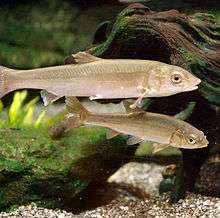Big-scaled redfin
The big-scaled redfin (Tribolodon hakonensis), also known as the Japanese dace,[1] is a medium-sized Asian fish.[2] First described by Albert Günther in 1877 as Leuciscus hakonensis,[2] it is the type specimen of the genus Tribolodon, having been described again as Tribolodon punctatum by Henri Émile Sauvage when he established that genus in 1883.[3] It is the most widely distributed of the Tribolodon species, found over much of the Sea of Japan.[4] It is known to carry a number of parasites, including the trematode species Centrocestus armatus (for which it is a second intermediate host),[5] and the copepod species Ergasilus fidiformis, which is carried in the fish's gills.[6]
| Big-scaled redfin | |
|---|---|
 | |
| Scientific classification | |
| Kingdom: | Animalia |
| Phylum: | Chordata |
| Class: | Actinopterygii |
| Order: | Cypriniformes |
| Family: | Cyprinidae |
| Genus: | Tribolodon |
| Species: | T. hakonensis |
| Binomial name | |
| Tribolodon hakonensis Günther, 1877 | |
| Synonyms | |
|
Leuciscus hakonensis, Günther 1877 | |
References
- Khanna, Bhavna (2004). Ichthyology Handbook. Berlin, Germany: Springer Verlag. p. 657. ISBN 3-540-42854-2.
- "Tribolodon hakonensis (Günther, 1877)". Fishbase. Retrieved 22 February 2015.
- "Taxon details: Tribolodon Sauvage, 1883". World Register of Marine Species. Retrieved 25 January 2018.
- Sakai, Harumi; Goto, Akira; Jeon, Sang-Rin (2002). "Speciation and Dispersal of Tribolodon Species (Pisces, Cyprinidae) around the Sea of Japan". Zoological Science. 19 (11): 1291–1303.
- Waikagul, Jitra; Thaekham, Urusa (2014). Approaches to Research on the Systematics of Fish-Borne Trematodes. London, UK: Academic Press. p. 94. ISBN 978-0-12-407720-1.
- Yamaguti, Satyu (1953). "Parasitic Copepods from Fishes of Japan – Part 7. Cyclopoida, III and Caligoida, IV" (PDF). Publications of the Seto Marine Biological Laboratory. 3 (2): 221–231.